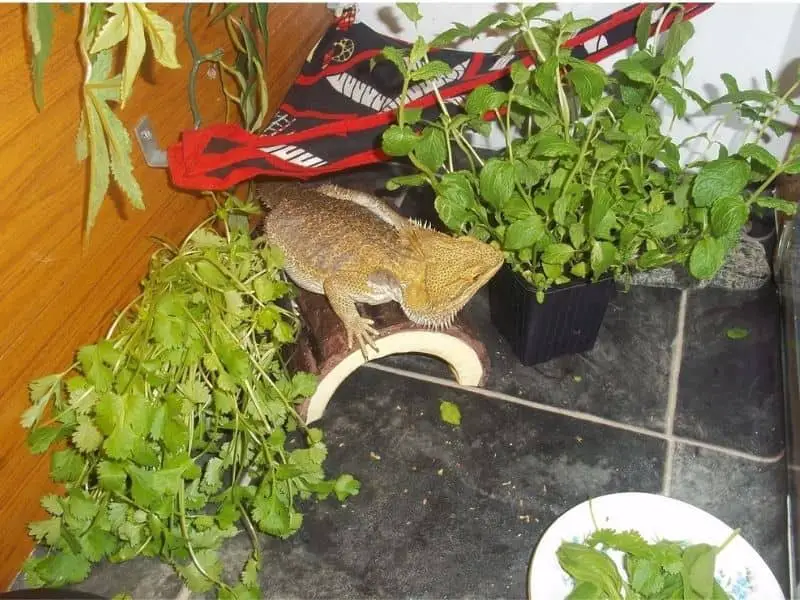Cilantro is a popular herb that has been used for centuries to season food. Since it is food for humans, you might be wondering whether it is safe to feed it to your reptile pets. So, can bearded dragons eat cilantro?
You can feed your bearded dragons with cilantro. Simply chop the cilantro leaves and mix them with some cut cactus leaves, pieces of carrots, or apples, and other vegetables to make a salad for your reptile pet.
Can Bearded Dragons Eat Cilantro?

Bearded dragons can eat cilantro as it is a safe plant for them to eat. The type of cilantro you should not feed your bearded dragon is the flowering plant as it can cause liver failure in reptiles and mammals.
Bearded Dragons are omnivores, meaning that they like both plants and meat/protein sources. They need a diet with large amounts of calcium, which is found in dark, leafy greens. Bearded Dragons will also eat fresh fruits and vegetables (especially tomatoes) as well as some plants or flowers that are safe to feed them such as cilantro.
Your beardies can not only eat the leaves of this herb but its seeds too.
You should, however, be aware that cilantro contains a chemical called furocoumarin, which is photo-toxic and can cause some health issues in animals.
Nutritional Benefits of Cilantro for Reptiles
Cilantro, also known as coriander, has many benefits for bearded dragons and other reptile pets, including various vitamins and minerals such as iron, magnesium, folate, vitamin A, vitamin C, and more.
Here’s the nutritional benefit and value bearded dragons will get from eating cilantro:
Calcium
Calcium for Bearded dragons is important for growing and maintaining strong bones and teeth. A bearded dragon that eats cilantro will get a good amount of the calcium they need in a day. For example, a 10-gram serving of cilantro has about 0.7 mg of calcium.
The amount of calcium found in cilantro is not much, but feeding your bearded dragon this herb daily, or fairly regularly, can help improve its dietary calcium intake.
Note: If your bearded dragon has a calcium deficiency, it may show signs of a calcium deficiency such as stunted growth, loss or change in coloration, lethargy, and even indigestion.
Vitamins A and C
Cilantro also has other important vitamins that are good for a bearded dragon’s diet. A single serving of cilantro contains about 11% of the daily requirement of vitamin C and about 40% of the daily requirement of vitamin A (in humans).
Vitamin A is essential to maintain healthy eyesight, skin, teeth, bones, cell growth, reproduction, while vitamin C is important for strengthening the immune system and wound healing.
Your bearded dragon can also benefit from these vitamins, which is why it is a great idea to feed the reptiles on a diet that includes cilantro greens.
Vitamin K
A bearded dragon that eats cilantro will also get a good amount of vitamin K, which is essential for the blood to clot and repair damage caused by cuts or wounds.
Vitamin K can be found in both green leafy vegetables such as spinach and other sources like eggs and cheese. A serving of cilantro has about 0.06 mg of vitamin K.
Note that signs of vitamin K deficiency in reptiles include poor growth, lethargy, and pale coloration.
Cilantro is a food that can be beneficial to bearded dragons in many ways such as supplying them with calcium and other vitamins which will help improve their health.
Antioxidants
Cilantro is also a good source of antioxidants, which can help fight against cancer cells and oxidative stress.
Oxidative stress occurs when there are too many free radicals floating around in the body of your reptile that causes damage to the cells and DNA. These harmful molecules originate through exposure to things such as pollution, smoke, radiation, certain foods like processed meats, air pollutants such as cigarette smoke.
The antioxidant properties found in cilantro could help lower long-term health risks associated with high levels of oxidative stress caused by these external factors.
Therefore it could be beneficial for bearded dragons to eat cilantro weekly to help improve their overall health.
Potassium
Potassium is also found in cilantro and can help control blood pressure levels. However, when a bearded dragon gets too much potassium, it could lead to health problems such as high blood pressure or kidney damage. When there isn’t enough of this electrolyte, the animal will experience weakness, dehydration, diarrhea.
Note that eating cilantro regularly can provide your reptile with an ample amount of potassium they need for their diet.
Fiber
Cilantro also has fiber, which is essential for digestive health. It can help regulate digestion and give your bearded dragon a feeling of fullness after eating the herb.
If you are feeding your bearded dragons on insects alone, you might find the reptile suffers from poor digestion. You can fix this problem by supplementing the diet with cilantro greens.
Water
Fresh cilantro herbs contain 90% water, which is a great way of hydrating your reptile.
Note that hydration is essential for a bearded dragon’s health. If your bearded dragon does not get enough water, it can lead to problems such as kidney stones, renal failure, and even death in extreme cases.
A hydrated lizard will also be more active and have a better appetite than one that isn’t hydrated enough or doesn’t drink enough water.
Cilantro may not look like something your bearded dragon would want to eat but this herb contains many vitamins that are necessary for the animal’s diet which could help make their life healthier overall.
Healthy Calcium to phosphorus Ratio
Unlike many other vegetables, cilantro contains more calcium than phosphorus. Since your bearded dragon requires calcium and phosphorus in a ratio of 4:1, it is healthy to feed the reptile with cilantro as a good source of these minerals in the right ratio.
An imbalanced ratio of calcium and phosphorus can lead to problems such as metabolic bone disease. This is when the body breaks down bone to release calcium and phosphorus for other uses, such as creating new cells or supporting nerve function.
Bearded dragons with MBD will show similar signs including loss of appetite, difficulty breathing, weakness/paralysis on one side of their bodies (neurological), and seizures that come without warning.
How often can bearded dragons eat cilantro?
It is best to feed bearded dragons cilantro sparingly. Cilantro should be fed 3-4 times a week, as it contains too much water that can cause diarrhea in your bearded dragon. It also doesn’t contain a lot of calcium, so you should not make it a staple for your beardie.
- Bearded dragons can eat cilantro as long as it is not offered with anything else in the feeding dish that might cause digestive issues such as fruit or vegetables high in sugar content and starches.
- Juveniles are more likely to enjoy eating fresh greens than adult beardies so feeding them cilantro every other day may help encourage feeding behavior without risking stomach upset by overfeeding.
- Bearded dragons do not require any dietary supplementation beyond live insects, which they will consume on their own unless presented otherwise.
Simply sprinkle your bearded dragon’s salad with a little cilantro to help diversify the food of the reptile. If the lizard likes it, you might want to increase the amount a little bit, but avoid overfeeding it with the same greens over and over.
How much cilantro can a bearded dragon eat?
Bearded dragons are omnivorous lizards, meaning they have a diet of both plant and animal matter including insects. Since we’ve already established that you can feed your beardie some cilantro greens, you might want to know how much cilantro bearded dragons can eat?
It would be wise to feed these reptiles a small amount of cilantro at first to see if they like it or not. There’s no absolute answer to how much cilantro leaves you can give your bearded dragons.
Feed your bearded dragon with 5-8 cilantro leaves in one serving because you will be mixing it with other herbs or greens. Choose fresh leaves and make sure to wash them clean before cutting and feeding your bearded dragons with cilantro.
The amount may also vary depending on the size of the bearded dragon:
- Feed baby beardies with 2-3 cilantro leaves every 3-4 days a week.
- Provide adult bearded dragons with about 8 cilantro leaves.
Caution: Ensure you chop the cilantro leaves finely to prevent them from choking the bearded dragon. Feeding the lizard on whole leaves can lead to choking.
Alternative Herbs for Bearded Dragons
Some cilantro alternatives for bearded dragons include thyme, sage, and mint. Here’s a list of herbs you can feed your bearded dragon with instead of cilantro:
- rosemary
- lavender
- fennel
- parsley
- radicchio
- dill leaves
- chicory
- thyme
Each of these herbs has its own benefits, so you might want to research to ensure you’re feeding your beardie the right way.
Sage is a popular cilantro substitute because it has similar flavors to cilantro but doesn’t irritate the throat as cilantro herb does.
Mint also provides an alternative with very different tastes that may be more appealing to your pet’s palate than cilantro can offer.
Thyme offers another option that can have strong aromatics while not being as irritating as cilantro or mint near the sensitive nostrils of your dragon.
READ NEXT: Can Bearded Dragons Drop Their Tails?

